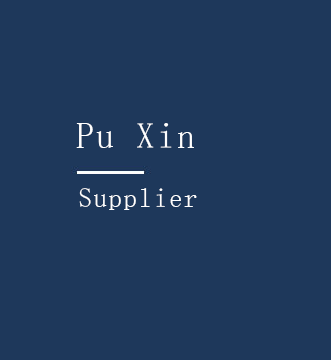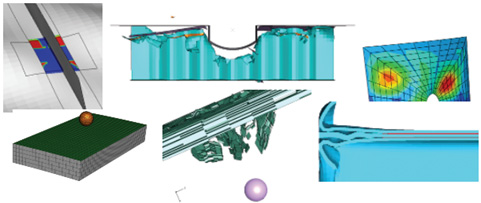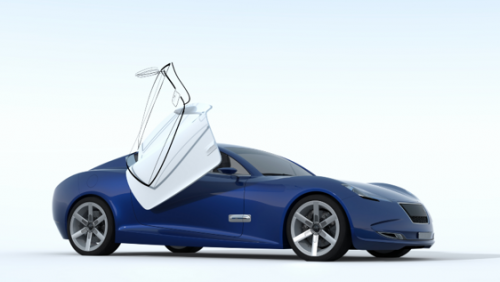ABAQUS
- introduce
Abaqus - powerful finite element software for engineering simulation
Abaqus is a powerful finite element engineering simulation software, which can solve problems
ranging from relatively simple linear analysis to many complex nonlinear problems.
Abaqus includes a rich library of cells that can simulate any geometry. And has various types of
material model library, can simulate the typical engineering materials Properties, including metal,
rubber, polymer materials, composite materials, reinforced concrete, compressible super elastic
foam materials, soil and rocks and other materials Material. As a universal simulation tool, Abaqus
can not only solve a large number of structural (stress/displacement) problems, but also simulate
many other engineering problems, e.g Such as heat conduction, mass diffusion, thermoelectric
coupling analysis, acoustic analysis, geotechnical analysis, electromagnetic analysis and piezoelectric
media analysis and other broad fields.
Abaqus solver includes -- Abaqus/Standard, Abaqus/Explicit. Abaqus also includes a full support
for the solution of the graphical user interface, namely human interaction before and after processing
module - Abaqus/CAE. Abaqus also provides dedicated modules to address specific problems.
Unparalleled Abaqus solver
Abaqus/Standard
Abaqus/Standard enables various linear and nonlinear engineering simulations to be implemented
effectively, accurately and reliably. Abaqus/Standard is an effective tool for analyzing many
engineering problems due to its extensive analytical capabilities, superior performance, complete
user base, and top-notch technical support. In addition, many common pre - and post-modeling
software supports Abaqus.
Abaqus/Standard provides a wide range of analytical procedures, from the analysis of common
linear problems to complex multi-step nonlinear problems, all of which can be solved efficiently
and reliably. Abaqus/Standard can simulate a large number of physical phenomena, such as thermal
conduction, mass diffusion and acoustic phenomena in addition to stress/displacement analysis.
The interaction between different physical phenomena, such as thermo - solid coupling, thermoelectric
coupling, piezoelectric coupling, acoustic - solid coupling, etc. For the above or other nonlinear
analysis, Abaqus/Standard automatically adjusts the convergence criteria and time step to ensure
the accuracy of the solution.
Abaqus/Explicit
Abaqus/Explicit integration (Explicit integration) provides precise, powerful and efficient finite
element solutions to simulate a wide range of dynamic and quasi-static problems. Abaqus/Explicit
is applicable to simulate highly nonlinear dynamics and quasi-static (adiabatic effect can be
considered), fully coupled transient displacement analysis, and acoustic-solid coupling analysis.
The annealing process can also be simulated, which is suitable for multi-step molding simulation.
Abaqus/Explicit is especially applicable to analyze transient dynamics problems, such as drop test
when mobile phones and other electronic products fall, ballistic impact and vehicle subsystem
impact. Surface-based fluid cavities can be used to simulate structures filled with fluid or gas,
including coupling analysis of structural deformation and internal liquid or gas pressure, such
as airbag deployment analysis.
Abaqus/Explicit's ability to efficiently deal with contact and other nonlinearities makes it an
effective tool for solving many nonlinear static-quasi-state problems, such as the simulation
of manufacturing processes (such as high-temperature rolling and sheet metal stamping) and
the slow extrusion of energy absorption devices.
Abaqus/Explicit's adaptive grid function enables it to simulate the severe deformation of a
large number of materials, such as metal forming. Acoustic functions provide transient
acoustic and solid coupling analysis, such as submarine response analysis under impact
load and impact load propagation under water. The function of acoustic analysis is
integrated with the simulation of bubble load, fluid cavitation and the influence of seabed
on liquid surface.
Standard-explicit co-simulation
Due to the respective advantages of Standard and Explicit, Abaqus/Explicit and Abaqus/
Standard are leading the development of advanced nonlinear simulation technology.
Abaqus/Explicit and Abaqus/Standard can be combined with each other and used for
the analysis of the same problem, providing unparalleled power and mobility for the
solution. It is common to integrate two solvers for finite element analysis.
Abaqus can define the two models with different response forms in the whole model
as Standard and Explicit forms respectively. During the analysis, data are constantly
transferred between the two solvers, so the large-scale complex model can be accurately
and effectively simulated without too much simplification of the model. Standard-explicit
co-simulation can be completely completed in Abaqus/CAE. Application examples: in
vehicle analysis, Car body and Suspension connectors are analyzed with Standard solvers,
and Wheel and Tire are analyzed with Explicit solvers.
The address of this article:http://en.pousensys.com/product/559.html
Key word:WhataboutABAQUS,ThefunctionofABAQUS,ThepriceofABAQUS
next:None






